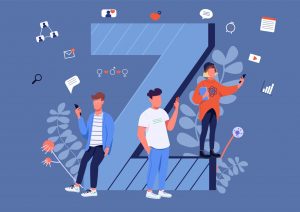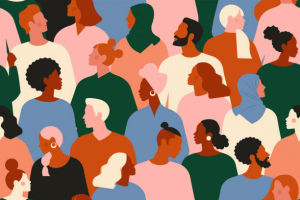
[Dao Insights]
What comes to mind when you hear ‘Generation Z’ (Gen Z)?
The strawberry generation? Our current youths and young adults? Unknown urban slang like ‘cheugy’ and ‘sus’? These are some common answers you may think of.
But there is more to Gen Z. Born between the years 1997 and 2012; they are the future of Singapore. Especially since more of them are gearing up to join the workforce and are starting to play an increasingly important role in our society.
Gen Z is becoming a force to reckon with. They’re stepping out into the world and bringing a storm of change!
Digitalisation and Technology

[iStock]
Raised in a technological era, Gen Z is the most internet-dependent generation. These digital natives are redefining technology and are influencing the use of technology across all ages.
From the rise of E-commerce to creating musicals on social media (e.g. Ratatouille: The TikTok Musical), Gen Z has showed us that the sky’s the limit for technology.
For example, when the pandemic hit, they were at the forefront of online entrepreneurship. They also used social media to hold campaigns and movements like the #Metoo movement and #blacklivesmatter.
And it will not stop there. These innovative and adaptable youths are leading in the further advancement of technology. For example, Artificial Intelligence (AI). Gen Z expects the broader digital world to know what their likes, wants and interests are and this has led to many companies adopting a more personalised approach with their customers (personalised experience).
Diversity and Inclusivity

[iStock]
Gen Z who grew up in a globally connected world are more diverse and inclusive. Social media has allowed them to learn about other cultures, news, and social issues earlier than previous generations.
Resulting in a population that is more open-minded, liberal, and advocates for the equal treatment of others. Issues like racism and sexism are some of the many concerns that Gen Z has, and they are not afraid to call others out on it.
They influence the people around them – like family, to be more accepting and inclusive to others. They also affect the economic and political fields as they tend to only support those who share the same open-mindedness.
This is making the world hyper aware of the discrimation and prejudice against minority groups, leading to more activism for more equality amongst people.
This will be beneficial for societies as we are able to be more accepting of each other and can learn from one another. There will be no limitations or restrictions to what a person can do, leading to more opportunities, and the further advancement of our communities.
Sustainability and Conservation

[iStock]
Growing up with the threat of global warming looming over them, Gen Z is more eco-friendly and supports sustainability and other conservation efforts. In fact, some Gen Z-ers have become influential figures in advocating for this cause – case and point: Greta Thunberg.
This leads to an increased awareness of climate change and global warming among the older generations, too, causing many to focus on environmental concerns.
This has also influenced nations and governments to invest and concentrate on environmental efforts and improving the environment sector, leading to more careers too!
Not only that, Gen Z is becoming the biggest consumer group and in 2021, accounted for 40 per cent of global consumers. So many markets are changing their strategies and tactics to be more environmentally friendly to appeal to them.
Education

[iStock]
With Gen Z comes short attention spans, digitalisation, and the need for personalised content. This means that the way schools teachers and tutors teach has changed during Gen Z’s reign in school.
Making lessons more engaging – with alternative mediums like videos or games and reformatting their lessons to fit a digital platform. These are some things that educators have to adapt to cater to Gen Z.
Because of Gen Z’s heavy reliance on technology and their self-reliant nature, they have also given rise to independent learning. Many Gen Z students rely on the internet for information and resources.
For example, the government in Singapore to look into encouraging self-directed learning, evident from the changes in syllabus, examinations and grading systems.
Workforce

[Depositphotos]
As Gen Z begins stepping into the workforce, we can expect them to bring a few changes to the office.
First up, work-life balance. Gen Z cares most about work-life balance and personal well-being. Meaning that benefits like mental-health days and paid time off are what attract and retain Gen Z in companies.
Gen Z also expects transparency and authenticity in the workplace. Gen Z grew up in a world full of fake news and misinformation, which has made them sceptical and cautious towards their employers and coworkers.
They prefer direct, top-down communication between them and their employers. This means that companies will have to look to a closer communication network among their staff and make the workplace more transparent.
Conclusion

[Campaign Asia]
Gen Z is young and new to the workforce and society. But it is safe to say that there is so much capability in this group of youths that we can look forward to. For the development of Singapore and even the world.
With their tech-savviness, adaptability and acceptance to change, Gen Z has many great days ahead of them.
Want to learn more about these amazing youths? Check out our other Gen Z article:
How is Gen Z Different and How Can You Relate to Them Better?
